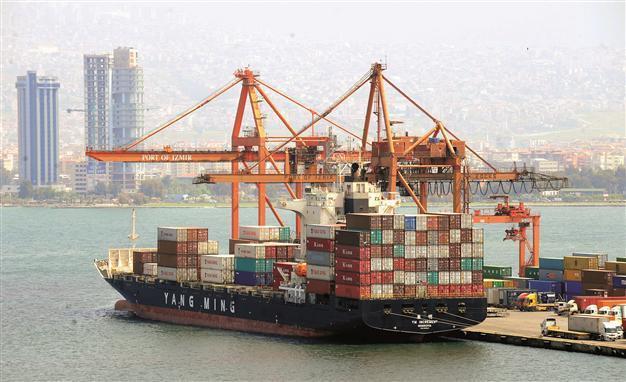UN survey warns Turkey to mend its current account gap
ANKARA - Hürriyet Daily News

A container ship in the izmir port in the Aegean province readies to carry Turkish exports. Turkey needs to increase its exports in order to reduce its trade deficit. AA photo
United Nations survey has forecast that Turkey’s gross domestic product (GDP) will grow by 3.2 percent in 2012, while warning of “serious repercussions” for any failure to finance the country’s gaping current account deficit.
The growth forecast for Turkey by the annual “Economic and Social Survey of Asia and the Pacific,” by the U.N. Economic and Social Commission for Asia and the Pacific (ESCAP), was more optimistic than the IMF’s forecast of 2.3 percent, but still lower than the government’s official projection of 4.5 percent.
“Even though the Turkish economy remains relatively more robust, it is not immune to stress in the international financial markets due to its high current account deficit, which has made the country dependent on external financing and thus exposed to fluctuations in global liquidity cycles,” the report, released yesterday, said. “Higher commodity prices and credit-fuelled domestic demand, which outstripped domestic supply, resulted in a rapid expansion of imports. As a result, the country’s current account deficit rose to 10 percent GDP in 2011. The sustainability of such a large deficit raises concerns about its financing given ongoing global financial volatility. A sudden reduction or reversal of capital flows could have serious repercussions for the Turkish economy.”
Turkey’s projected lower than other countriesTurkey’s projected growth ranked well below other economies the report covered, mainly because of the country’s direct exposure to the fallout of economic woes in European countries, which are Turkey’s principal trading partners. The survey stressed that inflationary pressure remained strong in Turkey, but added that due to moderating GDP growth and downward pressure on commodity prices, the double-digit inflation in the first three months of the year is expected to come down later in the year.
Turkey received acknowledgement for reducing its budget deficit and decreasing income equality, while continuing to grow.
Speaking at a press conference to launch the report in Ankara yesterday, Güven Sak, the head of the Economic Policy Research Foundation of Turkey (TEPAV) stressed the need to increase connectivity between Turkey and countries in the Asia-Pacific region in order to boost economic exchange. The Istanbul-Islamabad railroad, seen as a major link for the transport of goods, is plagued by serious infrastructure and logistical problems, he said, adding that Turkey, Iran and Pakistan should undertake major improvements to make it a viable trade route.
In its overall outlook for Asia and the Pacific, the report said that countries in the region face a year of slowing growth caused by troubled export markets and rising commodity prices, but stressed that the region will remain the fastest- growing in the world this year. Growth in the region will edge down to 6.5 percent in 2012 from 7.0 percent last year as the rumbling eurozone debt crisis and continued uncertainty over the U.S. economic outlook weaken demand for exports, it said. The region also faces a “new normal” of volatile commodity prices, which the U.N. warned will hit the poor hardest, unless governments make plans to soothe the pain of higher costs. Speculative inflows of money, over-reliance on natural resources, income inequality and high rates of unemployment -- particularly among the young -- will all require careful political attention, it said.
